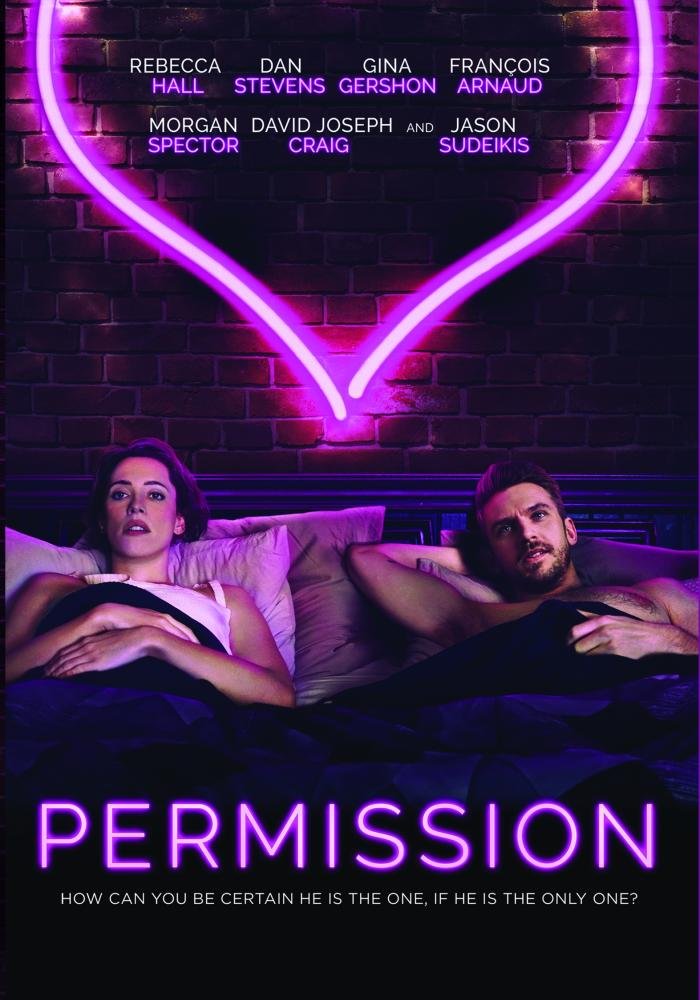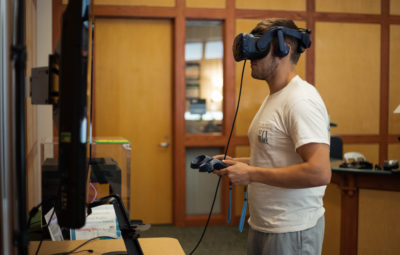
There’s something endearing about a couple who’s been together nearly 12 years without breaking up or finding someone or something better. It’s so endearing it could be called “constant and boring.” So, what does a couple do when they are presented with this problem of staleness in a relationship? They embark on an open relationship to figure out who they are before they get married.
Oh, and another thing, never listen to the drunk ramblings of your brother’s boyfriend.
That is exactly what Will (Dan Stevens) and Anna (Rebecca Hall) are faced with. On Anna’s 30th birthday, and on the evening when Will is set to propose, Will’s friend and business partner Reece (Morgan Spector) gets a bit too drunk on champagne and suggests that the couple should go out and broaden their horizons before settling down. Anna’s brother and Reece’s boyfriend Hale (David Joseph Craig) is mortified, but the damage has been done. Anna is bored with Will’s underperformance in bed and is blatantly curious about what it would be like to have someone else. Thus, starts the couple’s journey into polygamy.
On their first night on the town as simply “friends,” Anna immediately catches the eye of two suitors; one of them is the melodic soft rocker/composer of her dreams, Dane (Francois Arnaud). Meanwhile, poor Will is a klutz and leaves the club that night only with the realization that the woman he loves with all of his heart has gone off to sleep with another man.
Thankfully, Will doesn’t go empty-handed for long. He catches the eye of divorcee Lydia (Gina Gershon) with his almost euphemistic career path. He’s a woodworker. Will, bless his heart, is completely clueless. From the moment Lydia comes in and buys a table from his shop to the moment when he goes to deliver the table, he doesn’t realize that Lydia is interested in him. What results is a hilarious scene with Lydia waving a burning stick of cedar in his face and trying to seduce him as Will looks like a lost and confused puppy.
Hale and Reece get their own subplot that is way more tragic than two lovers trying to discover themselves, but it sadly gets sidelined for romance. To put it simply, Hale wants a baby, but Reece doesn’t. In fact, he doesn’t even want to talk about the subject. He brushes Hale off and focuses on the now instead of the future. The tension continues to ramp up until the audience is left with the ultimate question: can you ever stay comfortable and happy in a long-term relationship?
“Permission” asks a bunch of those little questions and writer and director Brian Crano expertly weaves each little question into a poignant plot point that has repercussions for our quartet. To primarily bill this film as a comedy is doing a disservice to its more dramatic overall theme, but Crano is so talented at blending everything so tightly and so interestingly together that the audience, myself included, doesn’t fully realize that this is a dramatic film masquerading as a comedy.
Sure, there are many instances that made me laugh. For example, Will is just a goofy klutz. There is no getting around that. He bumps into things and people. He’s not secure in himself at all, and it really makes me wonder how this man has managed to not kill himself in the woodworking profession all these years. I mean, this guy is just so adorably awkward that it’s endearing, and it extends far past his inability to walk in a straight line in a room full of people. When the audience is first introduced to Will, he literally can’t get it in. And yes, that is a euphemism. Once he does get it in, the sex lasts a grand total of twenty-five seconds. Yes, you read that right. Even Anna and Will’s dog looks bored.
Underneath all of Will’s insecurities and his affable, bumbling personality is Dan Stevens at the top of his game. He portrays Will effortlessly as this kooky, every-man construction worker who likes too much flannel and beer and steak, but underneath it all, Will is a charming man. The audience can see that he’s not quite sure of himself but if you really get him going, he’ll smirk at you with this boyish charm that covers the fact that he’s horrible at pleasuring women. It’s also worth noting that Stevens, in the more dramatic scenes, delivers his portrayal with such aplomb I felt bad for him. His ability to act with his eyes and subtle nuances in his face and his voice is on full display in “Permission.” and it makes the film quite enjoyable to watch.
That being said, the star of the show is Rebecca Hall, hands down. I, personally, hadn’t seen a Hall led film that I liked before “Permission” and I’m glad I gave this film a chance. Hall is so effervescent in this film. She plays Anna as a woman who is simultaneously sure of her life and yet unsure of her life with a delicacy that I’m not sure any other actor could have pulled off. Anyone else might have fallen into melodrama but not Hall. Every line and moment between her and Stevens are heartfelt and subdued with a quiet passion that slowly begins to unravel as Anna herself begins to unravel. There is just so much going on with Anna and Hall’s performance that I’m not sure I could successfully explore it without turning this review into a five-page essay.
The most important thing to take away from this film—besides not listening to your drunk friend rant and rave—is that just because a person is your first “person,” it doesn’t mean that they’ll be your “person” for forever. While “Permission” definitely has its laugh-out-loud moments, this is a much more dramatic romance. It will make you stop and think and then kick you in the gut while you’re smiling. The world needs smarter romantic dramedies, and this is the perfect bridge for that to start happening. So please, do yourself a favor and avoid films like “Fifty Shades Freed” and watch this quiet gem instead.







